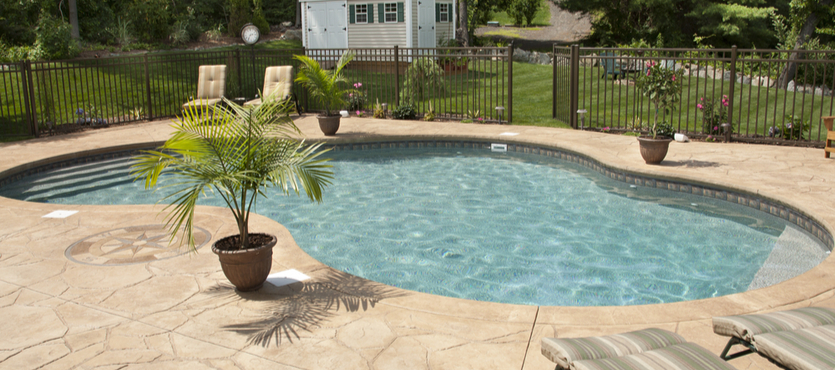Debating a salt water vs. chlorine pool? We are here to break down the pros and cons of both options to help you make the best decision for your swimming pool. Both offer a way to kill bacteria, reduce dirt, and prevent algae from multiplying in the water, as well as in your cleaning equipment.
What is a Chlorine Pool?
Chlorine pools have been the go-to method for maintaining sanitized pools for decades. Chlorine is added to the swimming pool in regular intervals to kill off bacteria in the water.
What is a Salt Water Pool?
Saltwater pools are gaining popularity as we try and move away from using as many harsh chemicals. Although, contrary to popular belief, saltwater pools are not chlorine free. Instead, they rely on salts that create a process known as “electrolysis” to produce minimal amounts of chlorine, just enough to disinfect your pool water.
So, the main difference is that a salt water pool naturally produces chlorine, while a chlorine pool involves manually adding straight chlorine to the water.
Pros to a Chlorine Pool
Chlorine pools still remain a popular option because they are more affordable to install and usually easier to maintain. Other benefits include:
- Lower upfront cost
- Requires less electricity – salt water pools need a special generator that converts the salt into chlorine. Chlorine pools simply rely on the pool pump to circulate water and chlorine throughout the entire swimming pool.
- Repairs tend to be less invasive and easier to conduct
Cons to a Chlorine Pool
- Chlorine isn’t easy on your eyes, skin, or hair. It can cause rashes, as well as red and irritated eyes. Plus, you may need special products to remove chlorine from your hair – or else you could end up with green hair!
- Chlorine is equally harsh on your pool deck painting and other finishes.
- You must add chlorine regularly in order to kill off bacteria; chlorine levels must be checked on a regular basis.
- In addition to chlorine, you’ll need to add balancing agents to the water.
- Your pool guy or gal will need to regularly check on the pool’s chemical composition since there is no automatic system in place to check it.
- Chlorine must be properly stored in the correct environment
Pros to a Saltwater Pool
While a saltwater pool is more expensive to install, there are a variety of benefits that come along with the extra investment.
- Salt water pools rely on lower levels of chlorine; therefore, it is easier on your skin, hair, and eyes. This makes it an excellent option for people who use the pool on a daily basis, such as kids or athletes.
- While the chlorine levels in a saltwater pool are effective, they are not strong enough to fade swim clothes or pool equipment.
- Less harsh on pool deck paint and other materials
- Self-maintaining system, which means less work on your behalf
Cons to a Saltwater Pool
- More expensive to install
- Requires a more complex system, which means it will require both minor and major repairs performed by an experienced professional at some point down the line.
- Saltwater pools require specific underwater lighting fixtures, heaters, liners and masonry work.
Chlorine vs. Saltwater: Which is Best for You?
Chlorine is ideal in terms of:
-Lower installation cost
-No additional energy cost
-Chemical control
Saltwater is ideal in terms of:
-Easy hands-off maintenance
-Lower maintenance cost throughout the year
-Greater overall health and safety
-Better return on investment – it is a selling point to have a saltwater pool in Florida
There is no one-size-fits-all answer to this question. Instead, the right option for you will depend on your budget, how often you use your pool, sensitivity to chlorine, and a number of other factors. Chlorine pools have been the go-to for many years. Although, upgrading to a salt water pool may be worth the investment.
We specialize in servicing, repairing and installing pools – making us an ideal candidate to help you decide which system will serve you best. Contact us today to learn more, ask questions, or get a quote.

